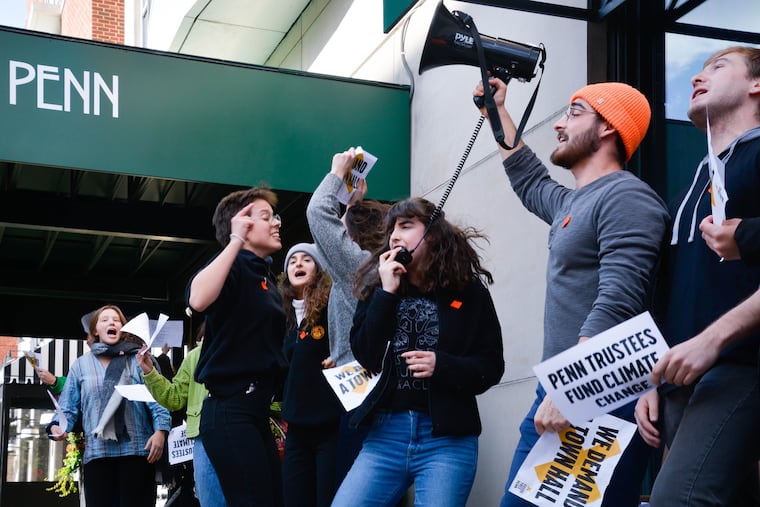Students are celebrating a small victory after Penn announced it won’t invest directly in some fossil fuels
Students who have been calling for the university to divest its portfolio from fossil fuels regard the university's announcement as a positive step, but say questions still remain.

For years, a student group at the University of Pennsylvania has called on the school to divest its financial portfolio of oil, gas and coal investments because of concerns about their impact on climate change.
Penn steadfastly refused, contending that investment decisions and the endowment should not be used to make public policy statements.
But now, the Ivy League university has made an announcement that its critics hailed as a step, if a small one, in the right direction. Penn said the school has no direct investments in the thermal coal or tar sands industries and doesn’t expect to put its money there in the future.
Environmentally conscious critics often point to those industries as the most problematic: Thermal coal and tar or oil sands are used in power production, and the extraction, transportation and burning of those fossil fuels is often cited as factors in climate change.
“Factoring the implications of a decarbonizing economy into investment decisions will materially limit the scope of fossil fuel-related investments in the portfolio,” said an email last week to the community from president Amy Gutmann, provost Wendell Pritchett, and executive vice president Craig Carnaroli. They said the university did not hold any such direct investments “and would not expect to hold going forward.”
Students were cautiously optimistic about the announcement.
“This is a monumental statement,” said members of Fossil Free Penn, a student group that in 2018 asked the university to divest of coal and tar sands holdings. "Penn is acknowledging that its investment decisions have consequences beyond the returns they generate, and that this reality will influence Penn’s investment strategy going forward.”
But students said they will continue to demand a town hall meeting on the topic because questions remain: Did Penn ever directly invest in these areas? Does it invest in other fossil fuels?
“We’re very happy they made this very tiny step, but there’s still a lot to do,” said Emma Glasser, a Penn sophomore who helped lead a fossil fuels protest at the board of trustees meeting in November.
Stephen J. MacCarthy, Penn’s vice president of university communications, said the statement from the leaders does not mean the university went through a formal divestment.
“The effect is very much the same, but divestment is a formal procedure requiring approval by the trustees that involves, among other things, liquidating holdings of particular investments,” he said. “Since the university did not directly own coal or tar sands investments and does not expect to own them in the future, the university did not go through the formal divestment process.”
He declined to comment further.
» READ MORE: From 2016: Penn to stay invested in fossil fuels
Mark Alan Hughes, faculty director of the Kleinman Center for Energy Policy at Penn, said the school’s tightly scripted announcement “either means they were smarter than everybody else and never had any of these — or they had some and already got rid of them.”
Either way, Penn, which has a $14.7 billion endowment, is striking the right balance, he said. Pulling back from all fossil fuels in one swoop wouldn’t be fiscally responsible. “If you stopped all fossil fuels tomorrow, the economy would become disrupted,” Hughes said.
More importantly, he said, Penn leaders signaled that they evaluate investments in relation to the Paris Climate Agreement, which has very ambitious targets for decarbonizing the economy. They also noted other promising initiatives, including negotiations for a power purchase agreement that will support the development of two new solar energy facilities in Pennsylvania.
At Penn, the controversy over fossil fuels has been ongoing for several years. Penn trustees in 2016 decided not to divest, asserting that the industry isn’t a “moral evil.”
Students continued their campaign, holding weekly sit-ins outside Gutmann’s office. In November, protesters disrupted the board of trustees meeting.
Other universities have cut ties with fossil fuels. Johns Hopkins University, Middlebury College, Stanford University, and the University of California are among those that have divested from at least some fossil fuels.
But schools including Harvard, Yale and Swarthmore have declined to do so.
Following a 32-day student sit-in, Swarthmore in 2015 announced it would not divest, citing investment guidelines that called for “the endowment to yield the best long-term financial results, rather than to pursue other social objectives.”
» READ MORE: A ‘new wave’ of activism on campus: Students are aggressively seeking their demands
Last year, a group of Penn faculty wrote a letter encouraging their university to engage with the protesting students and join other schools that have divested. Among them was Simon Richter, a professor of Germanic languages and literatures. He regards Penn’s announcement as a welcome change in stance.
“Up until this semester, students and faculty felt they were working against a stubborn and non-communicative administration,” he said.
Though Penn’s announcement did not credit students, Richter did. “An awful lot of credit goes to the persistence, the creativity, and the authenticity of our students,” he said.
Last Friday, students again sat outside Gutmann’s office, this time with party hats to celebrate what seemed like a small victory, Glasser said.
“But there’s still a lot to do,” she said.